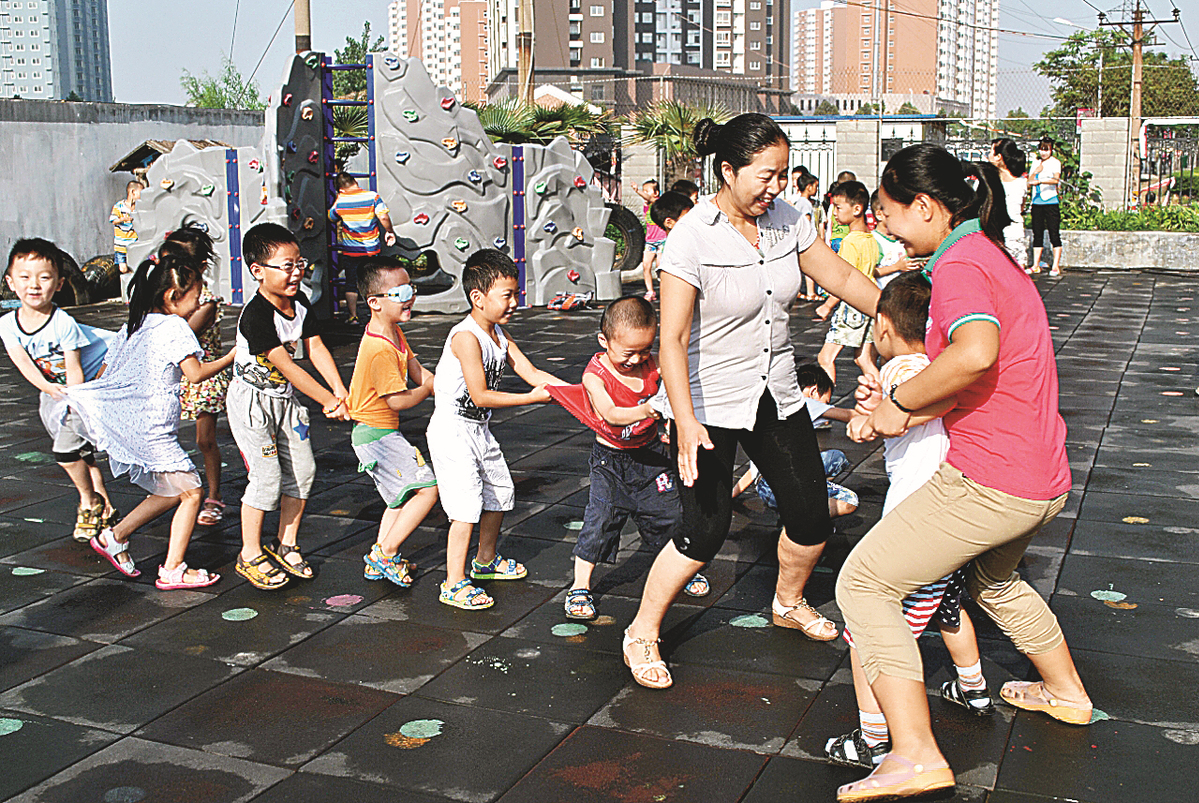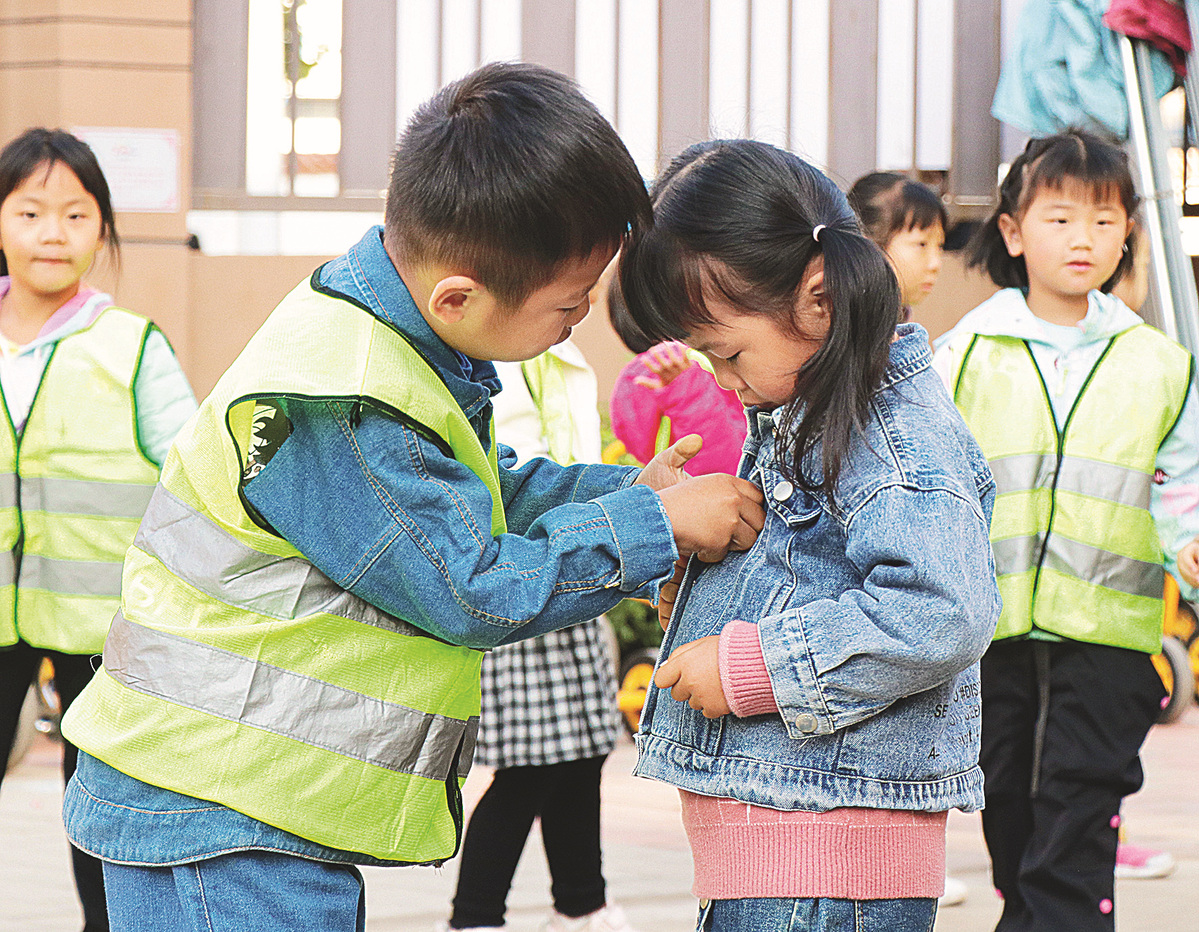Kindergarten Helps Promote Drive for Inclusive Education

Teachers play with nondisabled and disabled children at the Qisehua Kindergarten in Zhengzhou, capital of Henan province. SUN GANGJUN/FOR CHINA DAILY
Qisehua, in Henan province, has a long history of teaching children with special needs alongside their nondisabled peers. Li Hongyang reports.
For her son's preschool and nine years of compulsory education, Niu Nana insisted on finding places at nonspecialist schools instead of dedicated establishments for the boy. Her son, He Xin, was born with a visual impairment, cerebral palsy and other conditions.
The 50-year-old mother from Zhengzhou, capital of Henan province, said she made the right decision all those years ago. Her 26-year-old son not only works at a property management company with nondisabled colleagues, but he was also able to take good care of her when she had to be hospitalized.
"He has a strong sense of responsibility in his work. He even stuck to his post on July 21, when once-in-a-decade torrential rain hit Zhengzhou," Niu said.
In 1999, she sent He to a kindergarten in the city that was affiliated to the hotel where her husband worked. However, she was forced to take the boy out of school after just two weeks because some parents were afraid that their children might become infected with eye problems.
"I burst into tears when my son's teacher told me about the school's decision. I didn't want to put the teacher in a dilemma, so I agreed to remove He Xin. My self-confidence plummeted, and I became more concerned about negative comments or curious glances," she said.
Her son was born with cerebral palsy as a result of a lack of oxygen during delivery. He also has impaired vision, hearing problems and speech disorders. Niu said that after the birth she lost all confidence when faced with social situations.
"On one occasion, when Xin was about 6 months old, I heard strangers on the street discussing his eyes. I couldn't stop crying," she said.
"Despite my low confidence, I was determined to send him to a regular school. I know my son well. If he had been a total fool, I would never have tried to let him learn new things."
One day, a friend recommended Qisehua, a kindergarten in Zhengzhou that mainly accepts nondisabled children but also provides places for some with special needs, who account for about 12 percent of the total.
At first, Niu picked up her son immediately after class and took him home as quickly as possible so he would not play with the other children.
"I was afraid we would get curious looks from the other children and their parents," she said.
Later, though, she was reassured by the work of the kindergarten's teachers. "They patiently taught him how to read and pronounce words. The other children also played with him after class. Just six months later, my son could express himself clearly," Niu said. "Without the teachers' help, he would not have been able to attend regular elementary and middle schools or find a job."
In 2011, she swapped her role as a housewife to take a job with the kindergarten's adult department-an unusual addition for such an establishment-instructing people with special needs on activities such as community service or housework.
"Initially, my family was worried about my safety, but I have never been physically hurt by anyone. I came here to work because I want to help more parents like me," she said.

A boy helps button a girl's jacket during a Qisehua Kindergarten students' outing in October. ZHANG LIQUN/FOR CHINA DAILY
Specific role
Qisehua, founded by a company overseen by the Zhengzhou Civil Affairs Bureau, was specifically tasked with providing places for the children of people with disabilities.
In 1991, when Cai Lei was appointed as principal, she recalled how, as a teacher at a different kindergarten in the 1980s, she watched as a girl with Down syndrome was rejected.
"I was touched by seeing the girl grab the iron railings of the kindergarten's gate and try hard to say, 'Mom, I want to go to kindergarten.' Children with special needs are also children, and they also need education," she said.
Cai's father was an orphan. He was adopted by Cai's surrogate grandmother, who also raised many other orphans.
Her family background has given Cai a deep sense of empathy, so she quickly pushed for the kindergarten to begin receiving children with special needs, such as those with autism, Down syndrome, cerebral palsy and delayed development issues.
Liang Tian, who succeeded Cai as principal in 2015, said that before a special needs child enters the kindergarten, the teachers are provided with detailed information about his or her behavior and hobbies.
Then, when the child is introduced to his or her nondisabled peers, the teachers explain their interests and strong points, along with the correct way of approaching them and making friends.
"Children with special needs are faced with challenges in handling their daily lives. Our teachers and the nondisabled children discuss the correct ways to deal with unexpected situations and protect themselves. For example, a child with special needs may lose their temper and disturb the other children," Liang said.
She noted that when the kindergarten first admitted special needs children and placed them in classes with their nondisabled peers, parents began removing their children. Within six months, 87 of the total 118 had left.
"Some parents were concerned that their children would imitate the behavior of the special needs kids, which they thought would inhibit their intellectual development. That was because they knew very little about the special needs group," Liang said.
In the days when student numbers were low, the kindergarten had severe financial problems. It moved six times before 2020, when a permanent location was found for it after Zhengzhou's Guancheng Hui District approved 0.4 hectares of land for Qisehua's use.
"We never thought of giving up, because having taught so many kids with special needs, we knew their potential," Liang said.
"By communicating with their nondisabled peers, they can learn interpersonal skills and social rules. If they don't play or study with other kids at a young age, things will be even harder when they grow up."

A young girl with a mental disability greets a volunteer photographer at the kindergarten. [Photo provided to China Daily]
Wider impact
Qisehua currently has 351 attendees, and about 60 of them are special needs children.
Nondisabled children also benefit from the kindergarten's model of education, of course.
Sun Chun, a Qisehua graduate, works for a nonprofit social organization in Beijing that advocates equal opportunities for people with special needs and their families.
The 25-year-old said her childhood experience of meeting children with disabilities led her to choose special education as the subject of her master's at the University of Oregon in the United States, and also as the focus of her career.
"When I was in the kindergarten, a boy with Down syndrome, who was nicknamed Niuniu (meaning Ox), impressed me a lot. I treated children like him the same as the other kids, though I knew they were different in some ways. I was happy singing along when he played the electric organ," Sun said.
"We even performed on a program shown on Henan Television. Sometimes, Niuniu would offer to take care of me. I chose my major because I wanted to support people with special needs and their families. I think the career is meaningful."
In 2016, Qisehua set up a team to provide counseling for other kindergartens in Henan that receive children with special needs.
In September, Wei Huimin, a teacher from the Qisehua team, spoke at a seminar organized by the Geng Foundation in Beijing about serving rural people with disabilities. She told the audience that in her experience, rural kindergartens lack resources and professional teachers, and they are unable to meet the standards of even their lowest-level urban peers.
"When I visited a kindergarten in rural Henan, it could only guarantee one teacher per class. For a rural family, having a special needs child means the whole family feels a sense of shame and seldom communicates with relatives and friends, not to mention the problem of finding educational resources to support the child," she said.
"The rural kindergartens we support visit local village committees and disabled people's federations every year, and even hand out leaflets door-to-door, asking people to send children with special needs to them. Inclusive education should include all children with special needs in all cities and villages. No one should be left behind."
Li Lei contributed to this story.
